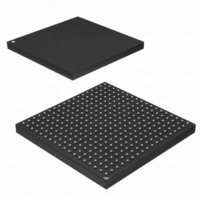AT91SAM9M10-CU Atmel, AT91SAM9M10-CU Datasheet - Page 728

AT91SAM9M10-CU
Manufacturer Part Number
AT91SAM9M10-CU
Description
IC MCU 16/32BIT ARM9 324TFBGA
Manufacturer
Atmel
Series
AT91SAMr
Specifications of AT91SAM9M10-CU
Core Processor
ARM9
Core Size
16/32-Bit
Speed
400MHz
Connectivity
EBI/EMI, Ethernet, I²C, SPI, SSC, UART/USART, USB
Peripherals
AC'97, DMA, LCD, POR, PWM, WDT
Number Of I /o
160
Program Memory Size
64KB (64K x 8)
Program Memory Type
ROM
Ram Size
128K x 8
Voltage - Supply (vcc/vdd)
0.9 V ~ 1.1 V
Data Converters
A/D 8x10b
Oscillator Type
Internal
Operating Temperature
-40°C ~ 85°C
Package / Case
324-TFBGA
Processor Series
AT91SAMx
Core
ARM926EJ-S
Data Bus Width
32 bit
Data Ram Size
32 KB
Interface Type
2-Wire, SPI, USART
Maximum Clock Frequency
133 MHz
Number Of Programmable I/os
5
Number Of Timers
2 x 16 bit
Operating Supply Voltage
1.65 V to 3.6 V
Maximum Operating Temperature
+ 85 C
Mounting Style
SMD/SMT
3rd Party Development Tools
JTRACE-ARM-2M, MDK-ARM, RL-ARM, ULINK2
Development Tools By Supplier
AT91SAM-ICE, AT91-ISP, AT91SAM9M10-G45-EK
Controller Family/series
AT91
No. Of I/o's
160
Ram Memory Size
64KB
Cpu Speed
400MHz
No. Of Timers
2
Rohs Compliant
Yes
Cpu Family
AT91
Device Core
ARM926EJ-S
Device Core Size
32b
Frequency (max)
400MHz
Total Internal Ram Size
64KB
# I/os (max)
160
Number Of Timers - General Purpose
7
Operating Supply Voltage (typ)
1.8/2.5/3.3V
Operating Supply Voltage (max)
1.1/1.95/3.6V
Operating Supply Voltage (min)
0.9/1.65/1.8/3V
On-chip Adc
8-chx10-bit
Instruction Set Architecture
RISC
Operating Temp Range
-40C to 85C
Operating Temperature Classification
Industrial
Mounting
Surface Mount
Pin Count
324
Package Type
TFBGA
Lead Free Status / RoHS Status
Lead free / RoHS Compliant
Eeprom Size
-
Lead Free Status / Rohs Status
Lead free / RoHS Compliant
Available stocks
Company
Part Number
Manufacturer
Quantity
Price
Company:
Part Number:
AT91SAM9M10-CU
Manufacturer:
Atmel
Quantity:
996
- Current page: 728 of 1404
- Download datasheet (22Mb)
35.9
6355B–ATARM–21-Jun-10
SD/SDIO Card Operation
The High Speed MultiMedia Card Interface allows processing of SD Memory (Secure Digital
Memory Card) and SDIO (SD Input Output) Card commands.
SD/SDIO cards are based on the Multi Media Card (MMC) format, but are physically slightly
thicker and feature higher data transfer rates, a lock switch on the side to prevent accidental
overwriting and security features. The physical form factor, pin assignment and data transfer
protocol are forward-compatible with the High Speed MultiMedia Card with some additions. SD
slots can actually be used for more than flash memory cards. Devices that support SDIO can
use small devices designed for the SD form factor, such as GPS receivers, Wi-Fi or Bluetooth
adapters, modems, barcode readers, IrDA adapters, FM radio tuners, RFID readers, digital cam-
eras and more.
SD/SDIO is covered by numerous patents and trademarks, and licensing is only available
through the Secure Digital Card Association.
The SD/SDIO Card communication is based on a 9-pin interface (Clock, Command, 4 x Data
and 3 x Power lines). The communication protocol is defined as a part of this specification. The
main difference between the SD/SDIO Card and the High Speed MultiMedia Card is the initial-
ization process.
5. Poll CBTC[x] bit in the DMAC_EBCISR Register.
6. If a new list of buffers shall be transferred repeat step 7. Check and handle HSMCI
7. Poll FIFOEMPTY field in the HSMCI_SR.
8. Send The STOP_TRANSMISSION command writing the HSMCI_ARG then the
9. Wait for XFRDONE in HSMCI_SR register.
h. Program LLI_W(n).DMAC_CFGx register for channel x with the following field’s
i.
j.
k. Program DMAC_DSCRx register for channel x with the address of LLI_W(0).
l.
errors.
HSMCI_CMDR.
–DST_DSCR is set to TRUE. (descriptor fetch is disabled for the DST)
–DIF and SIF are set with their respective layer ID. If SIF is different from DIF, the
values:
–FIFOCFG defines the watermark of the DMA channel FIFO.
–DST_REP is set to zero. Address are contiguous.
–SRC_H2SEL is set to true to enable hardware handshaking on the destination.
–SRC_PER is programmed with the hardware handshaking ID of the targeted
Program LLI_W(n).DMAC_DSCRx with the address of LLI_W(n+1) descriptor. And
set the DSCRx_IF to the AHB Layer ID. This operation actually links descriptors
together. If LLI_W(n) is the last descriptor then LLI_W(n).DMAC_DSCRx points to
0.
Program DMAC_CTRLBx register for channel x with 0. its content is updated with
the LLI Fetch operation.
Enable Channel x writing one to DMAC_CHER[x]. The DMAC is ready and waiting
for request.
DMA Controller is able to prefetch data and write HSMCI simultaneously.
HSMCI Host Controller.
AT91SAM9M10
728
Related parts for AT91SAM9M10-CU
Image
Part Number
Description
Manufacturer
Datasheet
Request
R

Part Number:
Description:
MCU, MPU & DSP Development Tools KICKSTART KIT FOR AT91SAM9 PLUS
Manufacturer:
IAR Systems

Part Number:
Description:
DEV KIT FOR AVR/AVR32
Manufacturer:
Atmel
Datasheet:

Part Number:
Description:
INTERVAL AND WIPE/WASH WIPER CONTROL IC WITH DELAY
Manufacturer:
ATMEL Corporation
Datasheet:

Part Number:
Description:
Low-Voltage Voice-Switched IC for Hands-Free Operation
Manufacturer:
ATMEL Corporation
Datasheet:

Part Number:
Description:
MONOLITHIC INTEGRATED FEATUREPHONE CIRCUIT
Manufacturer:
ATMEL Corporation
Datasheet:

Part Number:
Description:
AM-FM Receiver IC U4255BM-M
Manufacturer:
ATMEL Corporation
Datasheet:

Part Number:
Description:
Monolithic Integrated Feature Phone Circuit
Manufacturer:
ATMEL Corporation
Datasheet:

Part Number:
Description:
Multistandard Video-IF and Quasi Parallel Sound Processing
Manufacturer:
ATMEL Corporation
Datasheet:

Part Number:
Description:
High-performance EE PLD
Manufacturer:
ATMEL Corporation
Datasheet:

Part Number:
Description:
8-bit Flash Microcontroller
Manufacturer:
ATMEL Corporation
Datasheet:

Part Number:
Description:
2-Wire Serial EEPROM
Manufacturer:
ATMEL Corporation
Datasheet:











